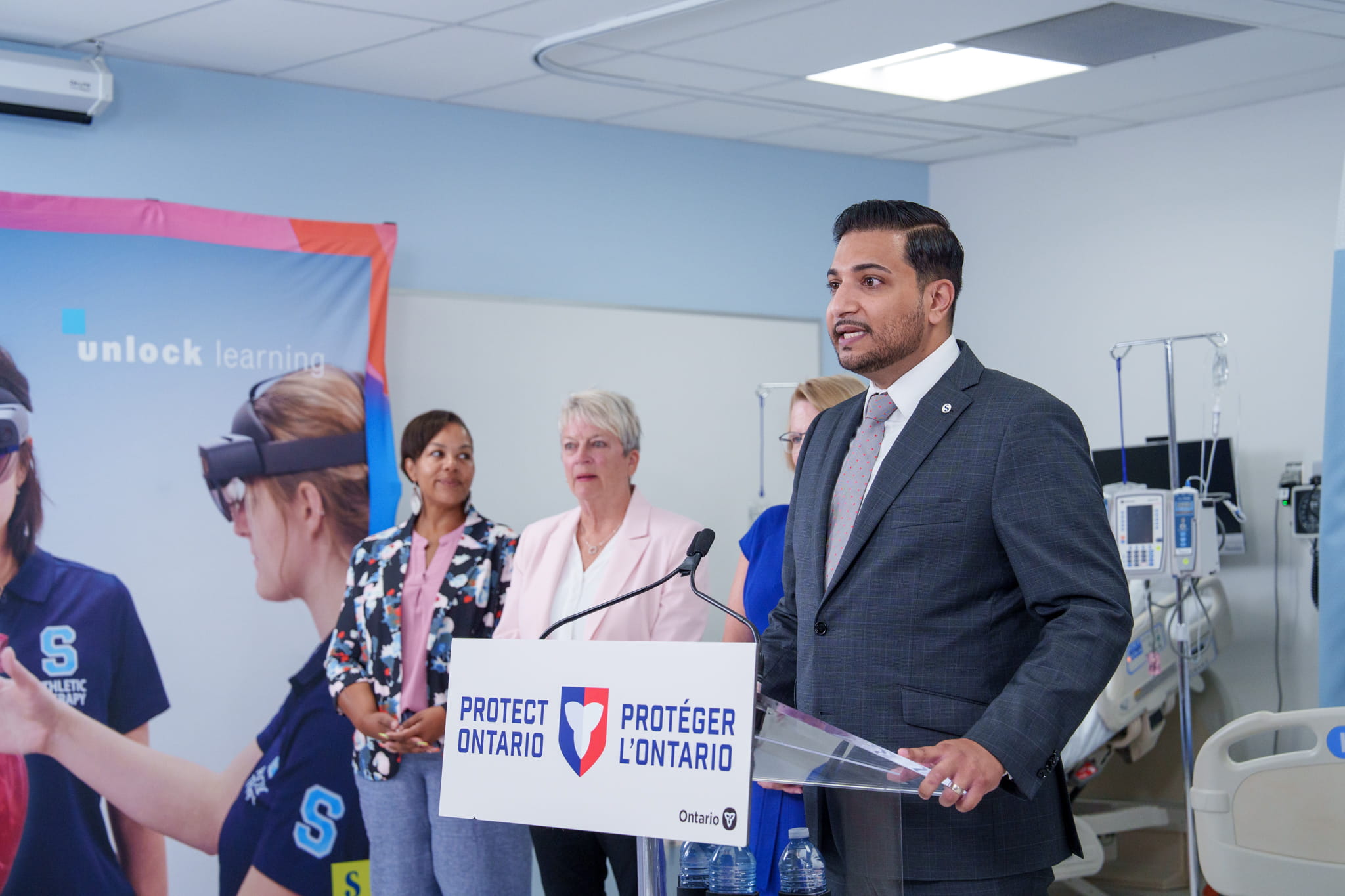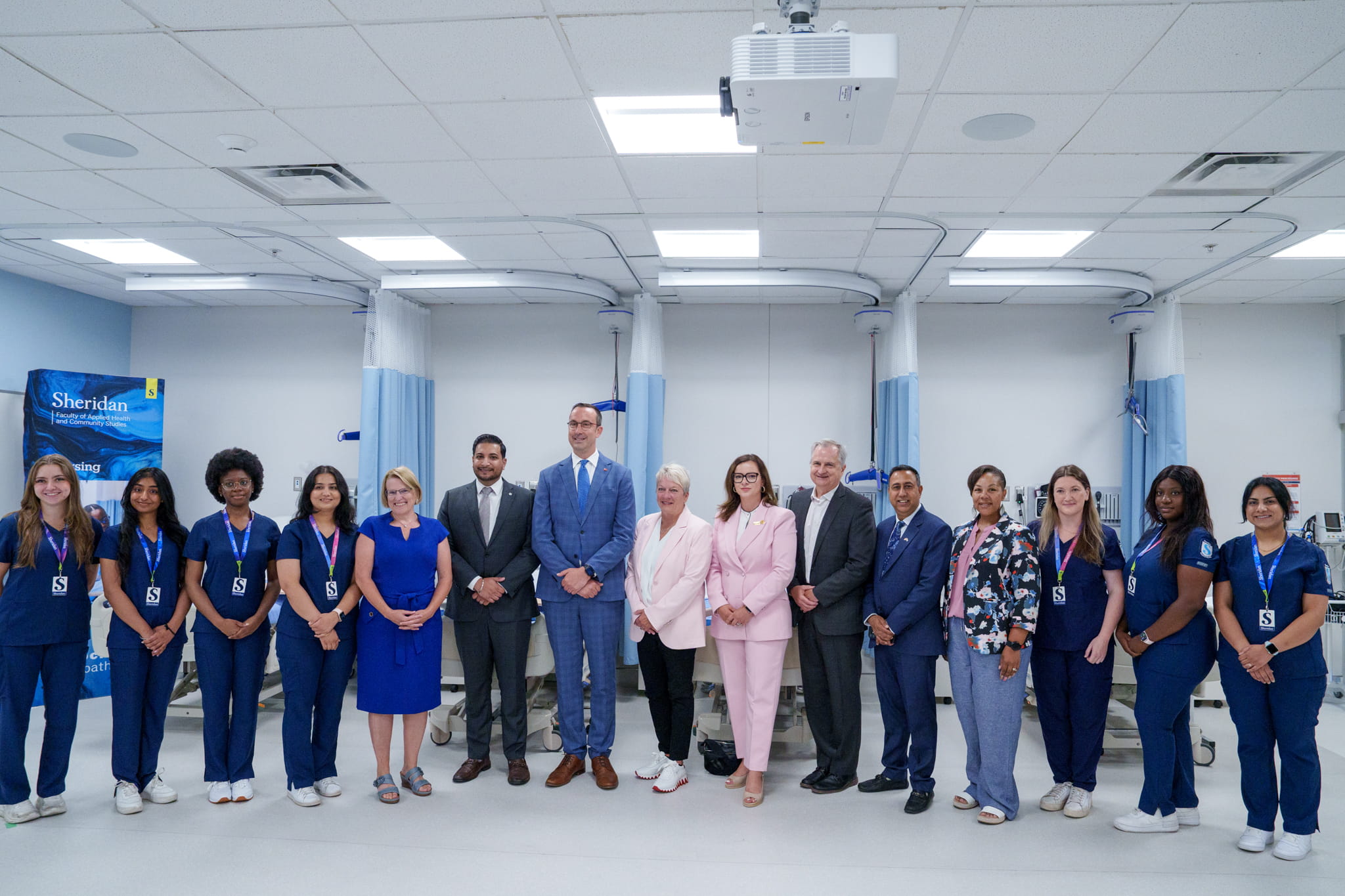
Sheridan expanding nursing programs to further support healthy communities
Sheridan's commitment to supporting healthy communities continues to grow with the expansion of its School of Nursing programs to accommodate nearly 150 more learners beginning this fall.
This one-year expansion of Sheridan’s Bachelor of Science - Nursing (BScN) degree (96 additional seats) and Practical Nursing diploma (48) is part of an announcement from the Government of Ontario made last week at Sheridan’s Davis Campus.
“Nurses are the lifeblood of healthcare systems throughout the world, and Sheridan is proud to be able to provide more learners with the opportunity to gain the skills, competencies and capacities required for sustained success in this demanding and vital role,” says Rajan Sandhu, Sheridan’s Interim President and Vice Chancellor. “This expansion also enhances Sheridan’s ongoing investment in healthcare education, which includes the recent introduction of degrees in nursing and osteopathy, growth of our Personal Support Worker program, and development of a new diagnostic imaging technology program. We are grateful for the support of our provincial government as we continue to invest in building a resilient and locally trained healthcare workforce to serve our communities.”

“Nurses are a vital part of Ontario’s health-care system, providing live-saving and compassionate care when patients need it most,” said Nolan Quinn, Minister of Colleges, Universities, Research Excellence and Security. “Our government continues to expand nursing enrollment in our colleges and universities and we’re proud to support Sheridan College’s School of Nursing programs so they can continue to equip students with the skills they need to strengthen our health-care workforce for generations to come.”
Launched in January 2024, Sheridan's BScN degree reimagines nursing education through an intraprofessional approach that teaches entry-to-practice competencies required of both Registered Practical Nurses (RPNs) and Registered Nurses (RNs). Other unique features of the program include multiple consolidation placements; an emphasis on culturally-inclusive care practices; embedded certificates that are valued by employers and designed to reduce burnout; and the opportunity to receive a diploma after two years of studies, which enables students to write the College of Nurses of Ontario (CNO)'s Regulatory Exam - Practical Nurse (REx-PN) licensing exam and begin working as a regulated healthcare professional.
Sheridan's Practical Nursing diploma prepares students for a career as a practical nurse. Graduates of the Practical Nursing program are eligible to apply to take the REx-PN licensing exam and pursue their license to practice as an RPN in Ontario.
Learning in both programs is enhanced through the use of virtual reality and augmented reality to display structures and systems in the body, better supporting students in challenging courses such as anatomy and physiology. BScN and Practical Nursing students also complete hundreds of clinical practice hours in the Centre for Healthy Communities at Sheridan's Davis Campus in Brampton, working in state-of-the-art nursing labs that are modeled after a real hospital ward.
The expansion of the BScD and Practical Nursing programs aligns with Sheridan's commitment to anticipating and meeting emerging needs of industry and community partners, a key area of focus in Sheridan's 2027 Strategic Plan. It also furthers the college's continual investment in programming, research and infrastructure that supports healthy communities, including development of a Diagnostic Imaging Technology program that will launch next month at Davis Campus.
“With Ontario’s healthcare system facing a significant nursing shortage and other unprecedented effects from the COVID-19 pandemic, it has never been more essential to expand and enhance our applied health programming and resources," says Dr. Michael O'Leary, Executive Dean of Sheridan's Faculty of Applied Health and Community Studies. "Sheridan remains firmly committed to creating sustainable and supportive healthcare solutions through research, innovation, thought leadership and student-centered education."

Over the past five years, Sheridan has also launched Canada’s first public postsecondary osteopathy degree and an Honours Bachelor of Social and Community Development degree; introduced graduate certificate programs in Clinical Kinesiology, Clinical Research, Addictions and Mental Health, Healthcare Administration and Service Management, and Nutrition and Food Service Management; offered tuition-free accelerated training programs for personal support workers (PSWs); enhanced and expanded its PSW program through a partnership with long-term care and retirement home provider Schlegel Villages; secured a $900,000 federal grant to fuel development of mobile health and machine learning innovations in health care delivery; and committed $20M to build a new Centre for Healthy Communities, supported by $2.5M in funding from the City of Brampton.
In February 2022, Sheridan hosted a virtual summit with health care experts and Brampton community leaders to discuss the state of health care in the city and potential solutions, including how to create a locally trained workforce that meets the unique needs of the community across the spectrum of care. Last month, Sheridan welcomed more than 100 healthcare practitioners, members of industry, educators and community members for a symposium addressing the need for chronic disease prevention.
About Sheridan’s Faculty of Applied Health and Community Studies
Sheridan’s Faculty of Applied Health and Community Studies offers programs in applied health, community studies, education, nursing and public safety. Students integrate theory with practice, knowledge with social innovation and life skills with scholarship, maximizing their impact on our local communities and global society.
Top photo: Interim President and Vice Chancellor Rajan Sandhu
Bottom photo, from left to right: Sylvia Jones, Deputy Premier and Minister of Health; Rajan Sandhu, Sheridan’s Interim President and Vice Chancellor; Nolan Quinn, Minister of Colleges, Universities, Research Excellence and Security; Maureen Adamson, Interim President of Colleges Ontario; Natalia Kusendova-Bashta, Minister of Long-Term Care; Steve Orsini, President of Council of Ontario Universities; Deepak Anand, Parliamentary Assistant to the Minister of Colleges, Universities, Research Excellence and Security; Charmaine Williams, Associate Minister of Women's Social and Economic Opportunity.
Media Contact
For media inquiries, contact Sheridan’s Communications and Public Relations team.



